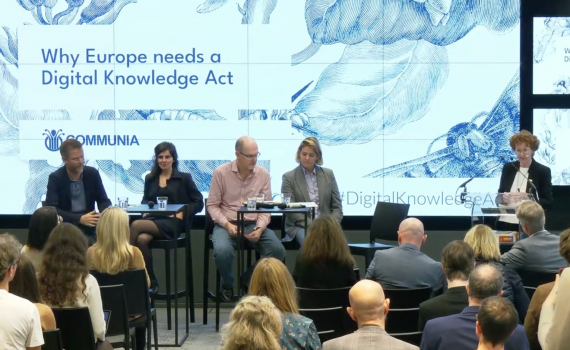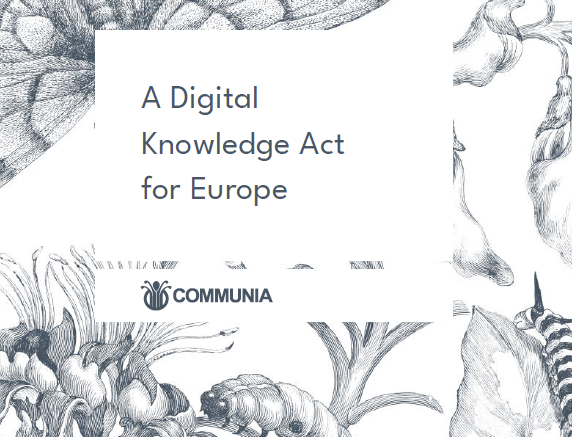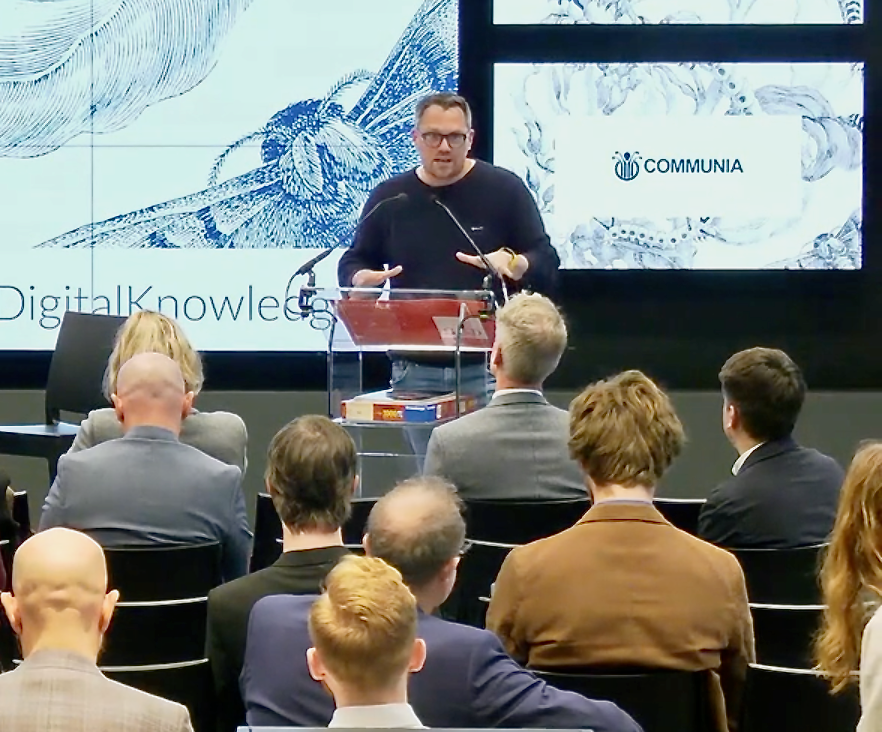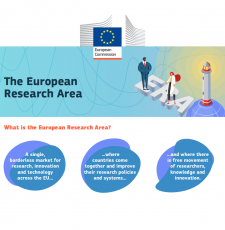
Teresa Hackett, EIFL Copyright and Libraries Programme Manager, reports on the launch of a new policy document by COMMUNIA setting out four actions to empower European knowledge institutions in the digital age.
On 2 October 2024, COMMUNIA, an international association based in Europe, launched A Digital Knowledge Act for Europe (DKA), that focuses on four targeted actions needed to empower knowledge institutions in the digital age: Protect the public domain, Unlock Research, Promote Digital Adaptation, Shield Institutions from Legal Risk.
I moderated the event that featured representatives of civil society who pitched proposals for the four actions, academics and practitioners who commented on the proposals, and an MEP, Tiemo Wölken, who provided closing remarks.
Action 1: Protect the public domain
Brigitte Vézina, Director of Policy and Open Culture at Creative Commons, pitched Action 1, ‘Protect the Public Domain’, that addresses legal barriers for the use of images of paintings, sculptures and other cultural objects that are out of copyright.
Recent high profile lawsuits in Italy threaten the public domain, a fundamental and long standing principle of the copyright system - when the term of protection of a work expires, it becomes free for everyone to access and use without restrictions. (The three lawsuits involve images of Botticelli’s ‘The Birth of Venus’ on clothing by fashion designer Jean Paul Gaultier, Da Vinci’s ‘Vitruvian Man’ on a jigsaw by German puzzle maker Ravensburger, and a hologram of Michelangelo’s Statue of David on the cover of GQ Italy Magazine). The problem has arisen because an Italian law on cultural heritage restricts the use of certain works held in national collections, even if the work is in the public domain (Bulgaria, France, Greece, Portugal and Slovenia have similar laws). These restrictions hollow out the public domain, muzzle creators, and they conflict with Article 14 of the Digital Single Market (DSM) Directive that affirms permission for the making of (faithful) copies of works of visual art when the term of protection expires.
What do we need? The legislator should step in with clear EU-wide legislation to ensure that use of public domain works is not restricted by cultural heritage or similar laws that have a pseudo-copyright effect.
Commentary: A work deemed to be of national cultural importance is not a justification for its removal from the public domain, said Giulia Priora, Professor at Nova School of Law in Lisbon. Indeed, it could result in counter claims of violation of artistic freedom, or the right to conduct a business (using a public domain work as part of a branding identity). Therefore transposition into national law of Article 14 of the DSM Directive should be done in a way that safeguards the public domain as intended (in relevant cases, the Commission could issue a formal letter of notice for incorrect transposition). In addition, the EU could strengthen its competence in the area of cultural heritage, building upon Article 3 of the Treaty on European Union (whereby the Union shall ensure that Europe's cultural heritage is safeguarded and enhanced). In the meantime, the DKA is an excellent starting point to highlight the importance of protecting the public domain from interference by cultural heritage or other laws.
Action 2 Unlock Research
Ben White, co-Founder of Knowledge Rights 21 pitched Action 2, ‘Unlock research’, that concerns barriers to accessing research materials, using digital research tools, and sharing research results.
Two recent high profile reports (Letta and Draghi) stress the role of research data and knowledge in Europe’s future success, and they warn of overly restrictive regulatory frameworks that hamper innovation and competition. From a copyright perspective, Europe's system is indeed rigid and inflexible - a fixed list of exceptions prescribes what a researcher is allowed to do with protected content, and if the activity is not on the list, it is by default unlawful.
What do we need? The Commission should introduce a flexible, open norm to support and harmonize research activities in the 27 EU member states, including across borders. A flexible, principles-based approach would provide a breathing space for researchers and downstream uses of research results to encourage innovation, novel ideas and new ways of working.
Commentary: Professor Martin Senftleben, University of Amsterdam sketched out what an effective EU-wide research exception would look like: mandatory (there is precedent for mandatory exceptions in European Directives), open (it should not focus on specific types of research tools or methodologies), cross-border (to avoid legal problems in multi-country research projects). It should permit the sharing of research results within a project or research community, and clarify the issue of ‘lawful access’ (for example, if a researcher in one country has access to data from a subscription database, is access to that data considered lawful for researchers in another country?).
From a legal perspective, there is solid theoretical groundwork for such a research exception and rulings from the European Court of Justice are pointing in the right direction. From a policy perspective, researchers in a digital, data-driven society must be able to conduct research reflecting societal developments. To achieve this, broad, flexible rights to access and use data for research purposes are necessary.
Action 3 Promote Digital Adaptation
Teresa Nobre, Legal Director of COMMUNIA pitched Action 3, ‘Promote Digital Adaptation’ that concerns the licensing of digital resources - the inability of institutions to get licences or to obtain licences on fair and affordable terms.
In a world where most content is born digital, libraries rely on licences to access books, journals, music and other content where the conditions for accessing, owning and, in some cases, using content are less favourable than the print world. As a result, publishers can (and do) refuse to license e-books to libraries (or the licences on offer don't meet their needs), force libraries to accept material they don’t need (because it comes in a bundle with a higher price tag), or arbitrarily withdraw titles from licensed packages (meaning that libraries no longer have effective control over their collection policies).
What do we need? We need an instrument (or other mechanism) that introduces an obligation on publishers to license content to libraries under fair terms and conditions, and safeguards against abusive licensing terms due to a dominant position in the market. It would address the power imbalance between rightsholders and institutions, helping to ensure that licensing terms are fair and affordable and the framework for lending e-books is equitable.
Commentary: Susan Reilly, Director of the Irish Research e-Library (IReL) described the practical experience negotiating licences. Even with substantial buying power (the consortium of 18 university libraries spends around €20 million a year on e-resources) and specialist skills (in licence negotiations, understanding the information needs of researchers, and data analytics), they still find themselves in take it or leave it situations with vendors, forced to accept the deal on offer or to compromise on their core guiding principles (to create a level playing field for research through equity of access, and to make Ireland competitive internationally through support for collaborative research).
Bernd Justin Jütte, Professor at University College Dublin, outlined the strong basis in European law for the introduction of an obligation on the right of access to information provided by the European Charter on Fundamental Rights and progressive rulings of the European Court of Justice. In concrete terms, such an obligation could be crafted so that libraries can acquire the content they need (including the purchase of individual works) on clear and reasonable terms.
Action 4 Shield Institutions from Legal Risk
Paul Keller, President of COMMUNIA and Policy Director at Open Future pitched Action 4, ‘Shield Institutions from Legal Risk’ that seeks to limit the liability of knowledge institutions for inadvertent copyright infringement.
Copyright exceptions in Europe are fragmented, so it is not always clear which exception applies and under what conditions. This complex regulatory environment combined with institutions that are by nature and necessity risk averse (non-commercial, publicly and under-funded, governed by external and internal regulations) creates a situation where exceptions granted by the legislator are often underused or not used at all for fear of inadvertent infringement. As a result, opportunities to digitize collections, or to undertake cross-border research projects, are missed.
What do we need? Safe harbour provisions should be extended to cultural heritage institutions (provisions already exist for Internet platforms and service providers) so that if an institution accidently trips over a legal complexity, it doesn’t result in hugely damaging financial consequences. The objective is to help dispel the fear of litigation so that cultural heritage institutions, acting in good faith, can confidently make use of exceptions granted to them.
Commentary: Susan Reilly, IReL highlighted a recent, particular concern with liability. Recently, open-ended liability is being imposed on libraries for the use of AI technology by end users. The provisions are extremely opaque and difficult to understand in relation to practical uses of AI tools by researchers, for example. As a result, libraries are reluctant to provide advice on what is allowed by the licence, even if they believe the activity is permitted by a copyright exception because if they make the wrong call, the consequences are serious - the institution is at risk of having its access suddenly cut, forfeiting money already paid to the vendor or being sued for damages.
Professor Senftleben, University of Amsterdam suggested a number of measures to address the problem, including the creation of safe harbours, a limit on damages, the indemnification of cultural heritage institutions, or the taking of fast-track class actions by cultural heritage institutions asking the European Court of Justice to rule on the issue. These practical measures might, he said, provide a greater degree of legal certainty than the application of a general ‘good faith’ standard (that applies in some other countries).
Remove barriers to knowledge for researchers and citizens - Tiemo Wölken, MEP
Closing remarks were made by Tiemo Wölken, a member of the Progressive Alliance of Socialists and Democrats (S&D Group) at the European Parliament. The proposal for a Digital Knowledge Act reads like an instruction manual for the mandate of the digital knowledge agenda, he said, that removes barriers to knowledge for researchers and citizens. Of course, knowledge comes at a cost (journalists, authors and creators have a right to earn a living), but we need to ensure the right balance. Access to reliable information and knowledge should not be difficult or overly expensive. Unfortunately, in the digital environment, legal barriers and costs have increased, and it is often easier to get fake news and bad facts than reliable, trusted information.
The first task ahead is to convince the incoming Commission of the need to prioritize the digital agenda (confirmation hearings for the new Commissioners will take place in November 2024). The message from MEP Wölken is to get started, because there is work to be done!
Further information
- Read A Digital Knowledge Act for Europe
- Watch a video recording of the event, Why Europe needs a Digital Knowledge Act, 2 October 2024.
- EIFL blog ‘Unlocking knowledge - creating a flourishing ecosystem’, COMMUNIA event, March 2024 that called for a Digital Knowledge Act for Europe.
SHARE / PRINT







